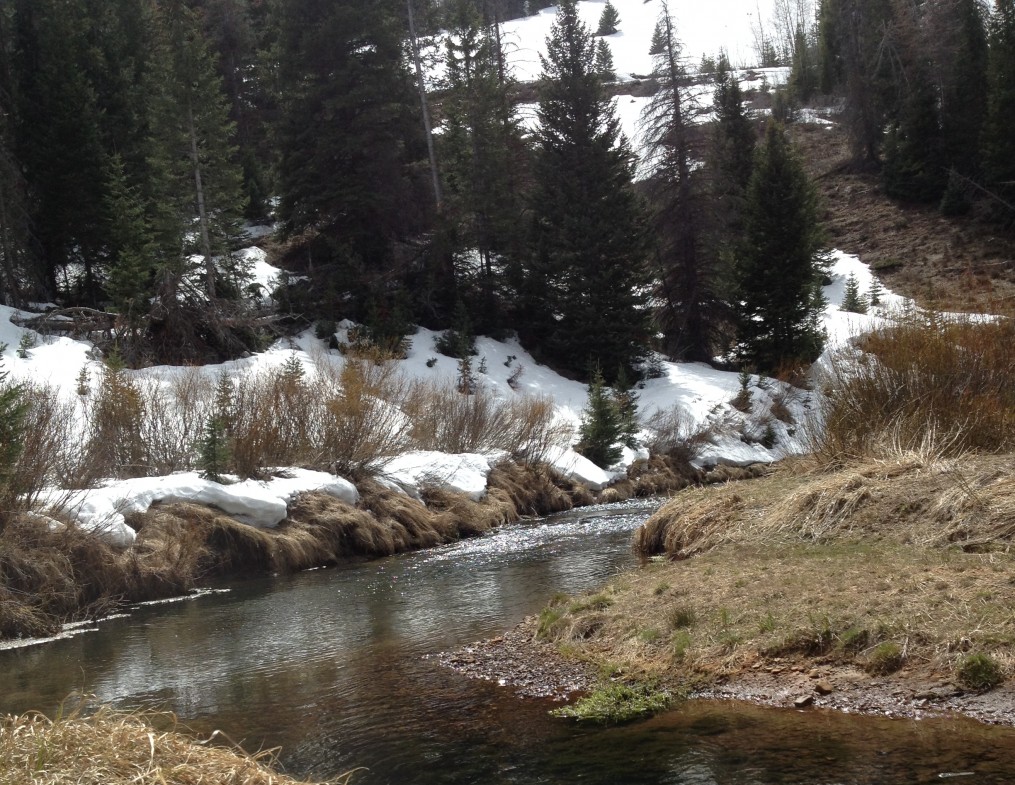SHIVERING JESUS
By
Robert Robinson
After five months of hunkering at the house and listening to snow and sleet rattle the windows, I’m running on negative pressure.
Fly boxes are filled, rods repaired, and fly lines and reels cleaned. I start checking weather reports, looking for any break that will let me get a jump on the season. Perhaps thinking that—by sheer willpower—I can force a change in the weather. I mean, I’m ready to do some fishing, weather be damned.
Memories of those first cold, miserable days when I find myself standing on the banks of an icy stream, shivering like I’m passing a peach seed, wishing I was back at the house holding a hot cup of Irish coffee in my hands are forgotten. I try not to think about breaking through hard-crust snow and going in up to my waist. I try not to remember the throbbing joints in my hands and the brittle ache in my feet.
I pull out the cold weather gear and look through my survival kit. I restock my ruck with power bars and instant coffee, and I make sure I have three ways to start a fire. I repack the ruck with camp stove, coffee pot, tin cup, dry socks, and poncho. I sharpen my K-bar and strap it to the ruck.
The oilskin duster that I cut down into a field jacket is good to go, and leaky waders have been repaired. My buffalo hair watch cap and shamagh are right where I tossed them last spring. Then I see them, the chink in my cold-weather armor—cold-weather fishing gloves. A chill runs up my spine.
I found these medieval torture devices on the discount table at a local fly-shop/gas station/bar & grill one summer. They are made of the same space age material wetsuits are made of—rubber. Actually they call the stuff neoprene, and when I looked it up in the dictionary to get the spelling right, I discovered that they had the unmitigated gonads to mention gloves in the definition. But In that August heat, they looked like they’d be downright hot to wear. I checked the tag—MADE IN CHINA.
That next winter, when I was standing up to my waist in freezing water, wondering how many fingers I was going to lose to frostbite, I had a clear mental picture of two Chinamen slapping each other on the back and yukking it up on their way to the bank: “Cold-weather fishing gloves . . . haw, haw, hawwwwwww!”
Designed with anglers in mind, they fit tight, and the thumbs and forefingers can be folded back and held “out of the way” with Velcro—to facilitate tying on tippet and flies and stripping line, I presume. But the only thing I found I could consistently do well with the gloves on was soil my pants.
The instructions said to wet your hands before putting the gloves on. Right. I’m supposed to stick my hands—hands already frozen from rigging up a fly rod and pulling on waders—into ice cold water, trusting that Chinese rubber gloves will somehow miraculously generate heat. Okay, I can see where a layer of ice between your fingers and the rubber might act as insulation.
I never came up with the intestinal fortitude to do that. You’d stand a better chance of getting your picture taken shaking hands with the Pope than you would of getting me to stick my hands into icy water after I’ve been fumbling with tippets and #20 Griffith’s Gnats in below freezing conditions. But I did wet my hands once, when the Velcro—which adheres well to tippet material and snags, snags, snags on anything else within a ten-foot radius—got hung up in my shorts while I was digging through three-inches of clothes and cursing cold-weather shrinkage during an emergency.
My exposed fingers got so cold I had to constantly look down to see if I was holding the fly line or if my fingers had snapped off. My hands got what my father would have described as cold as a well digger’s ass, or cold as a witch’s teat. I have no experience with either of those. I call it “shivering Jesus” cold—because all I could do was stand there shivering and hollering, “JESUS!”
My hands got so cold that I stopped fishing, started a fire, and put on a pot of coffee. I held the hot tin cup in my hands until the rubber softened and homogeneously bonded to the palms of my hands. Hair and lint stuck to my hands like poop to a blanket for weeks. And I began thirsting to whip somebody’s ass.
The more I stared at the cold-weather fishing gloves, the more my eagerness to get an early start on the fishing season and test my arctic survival skills weakened. Staying holed up at the house for a couple of more weeks, holding a nice hot cup of Irish coffee in my hands, and waiting for better weather seemed like a good idea. Actually, it seemed like a damn good idea.
So when my buddy called to see if I wanted to head up on the mountain and get a jump on fishing season, I told him I’d love to but something had come up; however, in an effort to ensure the success of his expedition and add to his fishing enjoyment, I sold him the cold-weather fishing gloves—at a modest profit, of course.
“Don’t forget to wet your hands before you put the gloves on,” I told him as he pulled out of my driveway.
“Huh?”
“Haw, haw, hawwwwwww!”
© Robert Robinson 2017 Unauthorized use and/or duplication of this material without express and written permission from this blog’s author and/or owner is strictly prohibited. Excerpts and links may be used, provided that full and clear credit is given to Robert Robinson and <flyfishingthehighcontry.com> with appropriate and specific direction to the original content.

